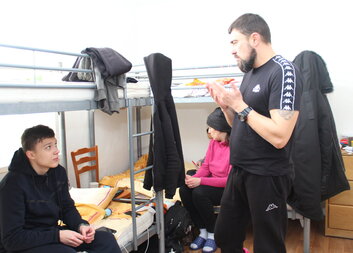Starting with February 24, 2022, Ukraine's civilian population has been forced to flee their country. Since then, millions of people have been displaced within Ukraine or in neighbouring countries. Poland, Romania, Slovakia, Hungary and the Republic of Moldova have become the main host countries for the Ukrainian people. Although Moldova is Ukraine's smallest neighbour and has the fewest economic resources, it has received the most refugees per capita so far. How is the country coping with the current situation and how is Caritas Czech Republic helping refugees in Moldova?
Moldova accommodated the most number of refugees per capita
According to official data, as of April 19, 2022, 426,964 Ukrainian refugees entered Moldova, of which almost 90% are women and children.
According to the authorities, not all persons entering the Republic of Moldova remain in the country. A large part of them go on to European countries, but even so, the number of refugees who choose to stay in Moldova is significant and constitutes about 4% of the entire population. Statistically speaking, Moldova has so far received the largest number of refugees per capita.
Authorities say Moldova needs 1 million USD per/day to care for Ukrainian refugees, and a refugee costs the Moldovan state about 25-30 USD /day. The Minister of Foreign Affairs, Nicu Popescu, announced that one third of this amount is covered by the state, and the other two thirds are provided by international organisations and other partner states, which have sent financial aid or various forms of international support.
Although Moldova has received external support, the refugee crisis and imminent humanitarian aid are putting pressure on the country's economic and energy problems, all the more so as exports to the Russian Federation, Belarus and Ukraine (which account for 14% of Moldova's total exports) have ceased since the conflict escalated.
Moldova needs the support of the international community
With such a large number of refugees, the Republic of Moldova is aware that it has not enough resources to be able to handle the exceptional situation it finds itself in, it has far too small budgets to cope with the daily pressure on its economic, social and health systems, does not have enough staff to meet the immediate needs of refugees, and has a much lower resilience than other Ukraine's neighbours.
Despite its shortcomings and challenges, Moldova continues to host people fleeing the war unconditionally.
The local authorities are constantly trying to find accommodation for refugees, but admit that they do not have the funds to supply them and the resources to logistically equip the placement centres: they do not have beds, blankets, technical or sanitary equipment to be able to provide refugees with decent living conditions.
Caritas Czech Republic's immediate help to Ukrainian refugees
Since the beginning of the war in Ukraine, Caritas Czech Republic has been working with central and local authorities to identify refugee placement centres in the country and the needs of these "hosts".
Caritas Czech Republic is continuously supporting refugees by providing health and social services and logistical support to the placement centres across the country to ensure that Ukrainians have a decent living that upholds human dignity.
Caritas Czech Republic's intensive and immediate assistance includes:
- 9 placement centres equipped with small and large appliances (214), beds (205), mattresses (470), blankets (595) etc.
- Constant health and social services for refugees
- Over 3,000 first aid kits and 3,000 hygiene kits distributed to refugees at customs checkpoints
- About 60 baby products distributed
Caritas Czech Republic will continue to provide intensive humanitarian assistance to the Republic of Moldova, thus promoting human dignity in the provision of social care.








